The scene looks straight out of the movie Doctor Strangelove, by Stanley Kubrick. Sitting at one of his famous oversized tables, Vladimir Putin, bunkered in his palace, draws, facing the camera, the nuclear threat. This February 28, four days after the Russian invasion of Ukraine, the world is seized with dread. Commentators are looking for their bearings: is this a remake of the Cold War? Are we on the verge of World War III?
“One thing is certain: the old world has disappeared, slice Richard Shirreff, retired British general and former commander of NATO. A new iron curtain has come down and the transatlantic organization now has a new frontier at Eastern Europe.” Behind this line, a gray area, facing the West, but deprived of the protection of NATO. Ukraine is now painfully paying the consequences.
“Our leaders had fallen asleep at the wheel! still deplores General Shirreff, who described the current scenario in 2017 in a novel of anticipation entitled War With Russia. They did not see the disaster coming. From 2008, however, after the occupation of Georgia, we had the reality before our eyes: Putin was a man determined to change the borders of Europe by force.” His declaration of war will have forced Westerners to choose their camp.
Vladimir Putin, who revels in the betrayals within the transatlantic family, probably did not expect such a start. Between the unilateral withdrawal of the United States from Afghanistan in the summer of 2021, the Trafalgar coup of the Aukus security pact (Australia, United Kingdom and United States) in Asia-Pacific – at the expense of France – and the the still-gaping wound of Brexit, everything indicated that the West had lost its compass. The master of the Kremlin took the opportunity to advance.
China and Russia “aligned as never before”
But before launching its mad war, Moscow sealed an all-important pact with China. Guest of honor at the opening ceremony of the Olympic Games (OG) in Beijing in early February, Putin celebrated a friendship of “unprecedented” quality. For the occasion, the Russian president, known for his extreme caution in the face of Covid-19, even dropped the mask alongside his counterpart Xi Jinping. Their common enemy? The United States, leader of a world order that Moscow and Beijing want to bury.
“The two countries are aligned as never before, comments Eugene Chausovsky, researcher at the New Lines Institute. Russia operated its own pivot towards Asia a decade ago to diversify its partners, a dynamic reinforced by Western sanctions. against the annexation of Crimea in 2014. China saw a golden opportunity there.” The two countries have beefed up their military (to the point of multiplying joint exercises) and economic partnership. Beijing also signed a contract in early February to supply 10 billion cubic meters of additional Russian natural gas. And diplomatically, Xi and Putin showed a united front at the Olympics: the former opposed NATO expansion and deemed Russian concerns legitimate, the latter asserted that Taiwan was “an inalienable party from China”.
But since Putin declared war on Ukraine, Xi has been walking on a tightrope. “On the one hand, China supports Russia and criticizes the West, continues Eugene Chausovsky; on the other, it does not want to see this conflict overflow, because that would have serious consequences for the world economy.” Not to mention China’s obsession with the principle of territorial sovereignty, and its intention to assert itself as a responsible leader on the international scene, not really compatible with Putin’s bloodthirsty offensive. This is why Beijing preferred to abstain during the vote of the UN Security Council on “aggression against Ukraine” on February 25. But she didn’t condemn her either.
“Block logic is outdated”
While playing neutrality, Beijing observes with the greatest attention the reactions of Westerners. “If Russia can act with impunity in Europe, China can also in Asia”, and particularly in Taiwan, fears, in a recent note, Raphael Cohen, analyst at the Rand Corporation. “If we sit down and allow authoritarian regimes to bully their smaller democratic neighbors into submission without repercussions, that will send a powerful signal to the rest of the world.” The Sino-Russian partnership would then be consolidated against the West in a new balance of terror.
But will this bond survive the conflict in Ukraine? On Tuesday, China began to distance itself from Russia. “Saying itself very concerned about the damage caused to civilians”, Beijing “deplores the outbreak of a conflict between Ukraine and Russia”.
The era of the Cold War is in any case well and truly over, recalls Bertrand Badie, professor at Sciences Po Paris: “The logic of blocks is outdated. Globalization and the interdependence it has created between countries are changing the given.” The United States, China and Russia are seeing other powers emerge, like Turkey or the United Arab Emirates. Yesterday’s enduring alliances will be replaced by shifting and riskier coalitions, predicts Badie. Never has the march of the world been so unpredictable.
